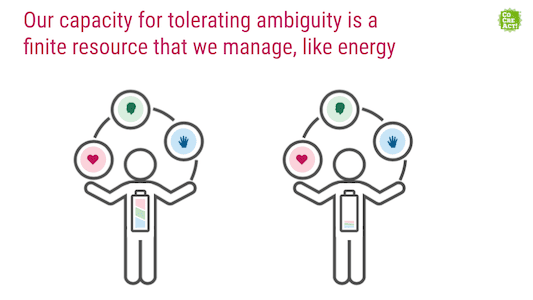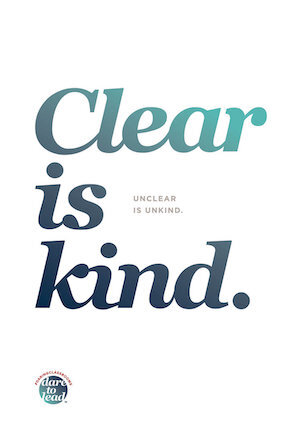Ambiguity Capacity Exhausted? Try this...
It has been a crazy year. So much change, uncertainty, flux, frustration…
Can you feel the pressure of the Corona crisis taking its toll on you?
Is it draining your energy?
Are you feeling overwhelmed?
We get it.
We’re right here with you, trying to cope with the uncertainty that this COVID 19 crisis creates. Information about COVID 19 is highly ambiguous so living life in it is even more so.
What do we crave in all this mess? Certainty.
When will we get it? Not soon enough.
We have to find ways to hang in there and cope since we don’t know when or if “this” will actually ever “end”.
Welcome to Ambiguity.
What in the heck is ambiguity? Put simply, ambiguity is the lack of clarity, typically caused by one or more of these factors:
Change
Any change, no matter good or bad, reduces clarity. We need time and effort to adapt until the new becomes normal.Risk
With every risk something is at stake. It challenges that status quo. If we take it depends on the urgency and the calculation thta we have more to gain than to loose.Information
The right (amount of) Information might help us to gain clarity. If not, we might have too much, not enough, contradicting, or wrong information. In that case information creates ambiguity.Complexity
Especially in a globalized and digital world we are a part of a system or network. The parts interact with each other in multiple ways. We might not even know all the parts which makes it harder to predict the system's behavior.Diversity
Life can be easier when we all think alike. Homogenous crowds have less conflict than heterogenous. Differences reduce clarity and create tension.
Usually we are facing some combination of these factors so it feels even more overwhelming.
The corona crisis is a potent example of ambiguity because we’re facing all of these factors and we’re stumbling through it together, as part of a global learning curve. Clarity is elusive because we lack consensus about the truth; even scientists and politicians have differing opinions and recommendations.
The good news!
We can all learn to cope better with overwhelming ambiguity! The key is what researchers call your “ambiguity tolerance”. A low ambiguity tolerance means that we are less comfortable with uncertainty and seek clarification and simple directions. When our tolerance of ambiguity is higher, we are more likely to defer the need for clarity and stay calm in the midst of life’s fuzzy situations.
© CoCreACT® 2020
Any change, be it good or bad, can create ambiguity in life. We all have different ways to feel, think and act in ambiguity, and even that differs individually: One day, you react to an ambiguous situation in your job with curiosity, recognizing an opportunity for your career and an eagerness to take chances. The next day, a very similar situation triggers a totally different response: You can’t take any more ambiguity and respond with anxiety, preferring to shut down and avoid dealing with the situation.
Consciously and unconsciously, day and night, we are constantly busy with worrying and thinking about how to deal with the uncertainties in our life. We prefer to think of ambiguity tolerance as a finite resource to manage, like energy. This means it can exhaust depending on how much we are using and requires time to replenish when it gets depleted. Like a battery, our tolerance drains more quickly when we are plugged into several ambiguous situations at once. And, like a battery, it is possible to recharge our tolerance when we feel it getting too low. How? Here comes some advice.
Our favorite 5 things to do to replenish your ambiguity tolerance
BE COMPASSIONATE
It is not at all surprising that we sometimes feel overwhelmed and lack energy; and somehow it seems to happen more often than ever before! Your tolerance of ambiguity may have reached capacity. It’s time to be more compassionate with yourself. To start, resist the temptation to compare your “Corona self” with your “usual” self. Different times demand different responses, and you are probably doing the best you can right now. Take it easy on yourself!
Don’t compare how you are coping with how others are doing it. When we feel low it is easy to believe that others are doing so much better, but this is often due to our perspective rather than what’s actually happening out in the world. There is a saying: Comparison is the thief of joy. When you resist comparison and embrace compassion, you keep that burglar away!
We are all different, and every day is different. Today some people might seem fine because they’re dealing differently with the ambiguity, having a high tolerance day. But maybe they’ll run out of energy tomorrow, or maybe what you see from the outside isn’t reflective of what is happening on the inside.
We are all in this together. So empathize with others and empathize with yourself. Empathy beats ambition any day. It is totally okay to not go on a diet right now, to not work out every day, to not consume news all day. Seek out what gives you comfort. Living in a pandemic is uncomfortable and stressful enough.
RECHARGE
In ambiguity, our feeling, thinking and doing revolve around how we can get through the uncertainties. The more overwhelmed we are, the less prepared we feel. And when we don’t feel prepared, we can sink it to survival mode, doing whatever we must to get by without giving ourselves the space to thrive.
Even more important to look after ourselves! Let what brings you joy help recharge your energy. You might need more breaks than before. Especially when we work remotely we need new rituals to end our work day, to end our stress cycle.
Perhaps you’re feeling guilty about neglecting the kids while working from home? (we do) Or maybe you’re stressed out because your boss still expects the usual results while you are stuck in remote meetings all day? (that’s just not fair!). We all have limited resources, especially when paired with the constant worry and change of the corona crisis on top of everything. But still, it’s essential to keep your own energy and needs in mind, to make space for yourself to recharge.
Let us introduce you to one of our favorite words, No. No is a wonderful word. In fact, No makes room for another of our favorite words, Yes! Now is actually a perfect time to learn to set boundaries by getting crystal clear about where and how you spend your precious energy.
The performance we were capable of before corona does not have to be the same now. The time has come to create new rituals with our families and friends, to set new expectations about what we are willing (and not willing) to give our precious energy to. Recalibrate what you are willing and able to do and say no to everything that goes beyond that. Say yes to more breaks, more comfort, more down time and more space for yourself to destress through unapologetic acts of joy.
REDUCE
As Brené Brown said: “Clear is kind.” You can make tolerating ambiguity easier by simply reducing the unnecessary. All it takes is one magic word: Routine. Routines soothe your tolerance of ambiguity because they reduce the cognitive load required for moving through your day and your life. This frees up that precious energy for other things.
It’s as simple as removing the repetitive or superfluous thinking, feeling and doing in your daily or weekly life. Reduce the time and energy of making decisions (which can create decision fatigue). Just wear your favorite combination of clothes every day, without thinking about what to wear in the morning. Don’t bother about fancy recipes and prepare the standard meals that you can do in your sleep. If possible, have a standing order for the usual groceries once a week. Simplify!
Where are you spending time and energy without very much payoff? Where do you see patterns of repetition that could be synchronized or reduced (i.e. consolidate your favorite morning rituals, food prep one day of the week, emails only during certain times of day, specific meals on certain nights of the week, etc.) Think of these efforts as little optimization rituals that you design just for you.
Where else can you reduce possible risks, uncertainties and decision making? Things are different now than they have been in the past, so go through the various aspects of your life and declutter! Save your energy for those challenges you have to face or choose to tackle.
CHOOSE
There are already enough battles you are forced to fight during a pandemic. If you have the choice to change your life during the corona crisis, it can turn out great if you are for it. So find the opportunities that you can influence.
And what might be worth it? If your personal life is stable and provides support, you might be more prepared for shifts in your work life. When you have a safe and enjoyable job, you might be more willing to take some chances with personal relationships.
Pick your battles: When there is an opportunity to make your life better, consider what might be worth the worry, thoughts and energy. Choose wisely. Taking big leaps might be too much of a risk right now. How about adapting to your chosen new normal by taking small and conscious steps forward?
Just look at the first two items above in our list, don’t push yourself too much.
TEAM UP
Ambiguity is a team sport.
The best advice we can offer is to connect! Build your nurturing circle of family, friends and colleagues, those who can support you in coping, making up your mind and making good choices. Those whom you are dedicated to supporting, too. Imagine a constellation of care that illuminates the darkness.
We are in this together. This is how we can grow. No one person needs to emerge as the hero, because no one individual alone will get us out of this. If we learn anything from our months of isolation and quarantine, perhaps it is this: that life, both surviving and thriving, is truly a joint effort, that it requires the collective intelligence and empathy of the crowd. Let us be each other’s heroes, whenever we need it and can offer it to those in need.
We hope our list helps you to adjust your tolerance of ambiguity. Start simply by practicing more self-compassion than in “normal” times. If you have the energy and curiosity, if you want to make the conscious choice to transform ambiguity into opportunity, to change something for the better, we are here to help. That kind of work is our passion and our specialty.





